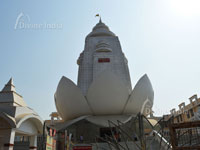

Om Devakisuta Govinda Vasudeva Jagatpate |
Dehi me tanayam krshn, twam aham sharanam gatah ||
Shankha chakra gada padmam dharyantam Janardanam |
Anke shayanam Devakyah Sutika mandire shubhe. ||
Evam rupam sada krshn, sutartham bhavayet sudhih ||
Shankha chakra gada padmam dadhanam Sutika grihe |
Anke shayanam Devakyah krshn vande vimuktaye ||
|| devakee sut govind vaasudev jagatpate dehime tanay krshn tvaahan sharanagate ||
The verses are in praise of Lord Krishna, particularly his divine form and the scene of his birth.
Here is the meaning
Verse 1:
O Lord Govinda, the son of Devaki and Vasudeva, the Lord of the universe.
Please grant me a son, O Krishna; I take refuge in you.
Verse 2:
He who holds the conch, discus, mace, and lotus, Janardana (another name for Krishna).
Lying in the lap of Devaki in the auspicious maternity room.
In this divine form, the wise one should always meditate on Lord Krishna for the sake of a son.
Verse 3:
Holding the conch, discus, mace, and lotus, in the maternity room.
Lying in the lap of Devaki, I worship Krishna for liberation.
These verses beautifully depict the vision of Lord Krishna's divine form, emphasizing his role as the protector and the object of devotion for those seeking his blessings. They also capture the moment of his birth in Devaki's prison cell and the immense spiritual significance associated with it.
The mantra is dedicated to Lord Krishna and is chanted with the specific intention of seeking the divine blessing for the birth of a son. Devotees may use this mantra in their prayers and rituals to request the grace of Lord Krishna for the gift of a child. It's important to chant mantras with devotion and a pure heart, focusing on the desired outcome while surrendering to the divine will.